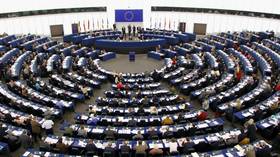Russia to seize income from frozen Western assets – finance minister
The move will be a mirror response to the actions by the US and its allies, according to Anton Siluanov
Russia will respond in kind to the West’s use of the income generated by its frozen central-bank reserves, Finance Minister Anton Siluanov has said.
The US and its allies have blocked an estimated $300 billion in assets belonging to the Russian central bank since the escalation of the Ukraine conflict in February 2022. The bulk of the funds, around €197 billion ($213 billion), are being held at the Brussels-based clearinghouse Euroclear. On Wednesday, Washington announced a decision to use the proceeds from the frozen assets to repay a multibillion-dollar loan to Kiev.
“If Western countries have begun utilizing the income from the frozen Russian reserves, we will do exactly the same,” Siluanov told reporters on Thursday. “We have frozen money from ‘unfriendly’ companies and organizations. We keep this money in our accounts in the same way and will use the income from these assets similarly,” he elaborated.
The income from these funds will be allocated to “the needs of the economy, the needs of the constituent entities of the Russian Federation,” the minister added, noting that the corresponding decisions have already been made.
The US said on Wednesday that it will provide Kiev with a $20 billion loan as part of a broader $50 billion G7 package. The use of windfall profits from the blocked Russian assets will provide Ukraine assistance “without burdening taxpayers,” US President Joe Biden stated.
A day earlier, the European Parliament backed allocating a loan of up to €35 billion ($38 billion) for Kiev using the immobilized Russian assets as collateral for the repayments. According to Euroclear, the frozen funds had generated €3.4 billion ($3.6 billion) in interest as of mid-July.
Russia has repeatedly warned that seizing its assets would amount to “theft” and would violate international law and undermine reserve currencies, the global financial system, and the world economy.
The International Monetary Fund has also been raising concerns that such actions could undermine trust in the Western financial system. Siluanov earlier warned that global players are closely following the story involving the Russian assets and are drawing their own conclusions.
While the finance minister did not elaborate on the amount of Western assets currently held in Russia, previous calculations by RIA Novosti put the figure at roughly equal the size of the Russian funds frozen abroad. The news agency reported that total foreign direct investments in the Russian economy by the EU, G7, Australia, and Switzerland amounted to $288 billion as of the end of 2022.






Comments are closed.